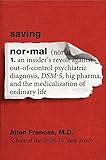The people you're talking about aren't denying the existence of real disorders, they're denying the existence of phony disorders -- and there are plenty.
Asperger's, popular a few years ago, is now recognized as a myth and has been removed from the DSM. Until the mid-'70s homosexuality was listed among the phony mental illnesses, finally removed after much pressure was put on the practitioners of this pseudoscience.
> The science on this is very strong.
The science of this is practically nonexistent. Are you aware that the director of the NIMH, the highest-ranking psychiatrist in the country, has recently decided to pull the plug on the DSM, describing it as too unscientific to be useful? And that, by pulling the plug on psychiatry's "Bible", he pulled the plug on psychiatry's dubious standing as a science?
> The problems these disorders cause the individual are very real and unmistakeably negative.
No more real than the average placebo response, which as time passes is becoming the default assumption that must be taken into account and that cannot be categorically eliminated until science eventually enters the field.
There is a core of very serious cases, like schizophrenia and some bipolar sufferers, but those are not mental illnesses, they are physical ailments with psychological symptoms. Purely mental illnesses have no scientific explanation, no reliable diagnostic criteria, and no treatments -- which is why the DSM is being abandoned.
> Sometimes conspiracy nuts equate mental disorders with some kind of "dissident" behavior that has to be censors.
You mean, like the editor of DSM-IV, now a critic of the mental health field, who has just written a book arguing that the epidemic of overdiagnosis collides with natural diversity? Like that? Are you aware that nature thrives on a wide spectrum of behaviors, that such a spectrum represents the genesis of all future improvements in the species?
"Saving Normal" (Allen Frances): http://www.amazon.com/Saving-Normal-Out-Control-Medicalizati...
NIMH director Insel: http://www.nimh.nih.gov/about/director/2013/transforming-dia...
Quote: "While DSM has been described as a “Bible” for the field, it is, at best, a dictionary, creating a set of labels and defining each. The strength of each of the editions of DSM has been “reliability” – each edition has ensured that clinicians use the same terms in the same ways. The weakness is its lack of validity."
Couldn't have said it better myself.

Which blogger would that be? Perhaps you're thinking of Thomas Insel, director of the NIMH, who has taken exactly the same position I have, and for exactly the same reason:
http://www.nimh.nih.gov/about/director/2013/transforming-dia...
Quote: "While DSM has been described as a “Bible” for the field, it is, at best, a dictionary, creating a set of labels and defining each. The strength of each of the editions of DSM has been “reliability” – each edition has ensured that clinicians use the same terms in the same ways. The weakness is its lack of validity."
"Unlike our definitions of ischemic heart disease, lymphoma, or AIDS, the DSM diagnoses are based on a consensus about clusters of clinical symptoms, not any objective laboratory measure. In the rest of medicine, this would be equivalent to creating diagnostic systems based on the nature of chest pain or the quality of fever. Indeed, symptom-based diagnosis, once common in other areas of medicine, has been largely replaced in the past half century as we have understood that symptoms alone rarely indicate the best choice of treatment. Patients with mental disorders deserve better." [emphasis added]
For the above reasons, the NIMH has recently ruled that the DSM may no longer be the basis of scientific research proposals, on the ground that it has no scientific content.
> ... parts of the field do have some serious issues, but to paint with such a broad brush and be so sure of yourself in casting dispersions [sic] on fields you have no formal training in is really gross to encounter.
Fair enough. Let's see how your viewpoint stands up under scrutiny. Do you think astrology is a science? No? But you don't have a degree in astrology -- doesn't that disqualify you from having an opinion on this subject? My point is that, in science, authority counts for nothing, only evidence matters. To put this another way, in science, evidence means everything, reputation means nothing. The greatest amount of scientific eminence is trumped by the smallest amount of scientific evidence.
Also, the expression "casting dispersions" isn't quite what you had in mind (s/dispersions/aspersions).
And finally, Allen Frances, editor of DSM-IV, has recently written a book that makes the same points I do (http://www.amazon.com/Saving-Normal-Out-Control-Medicalizati...).
If NIMH director Insel, or Allen Frances, tried to post to r/askscience, they would get the same treatment I got -- scientific censorship.
More here: http://arachnoid.com/building_science